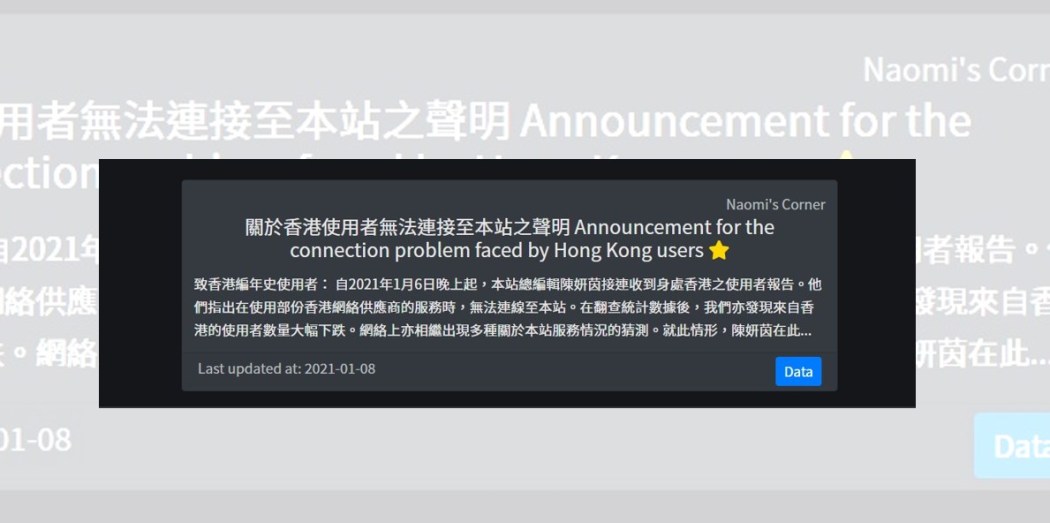Hong Kong police have ordered the city’s major telecoms providers to block access to an anti-government website, according to local media citing sources over the weekend.
The development confirms fears from the site operator last week that Internet Service Providers (ISPs) were interfering with access to the site HKChronicles at the request of the authorities.

The move marks the first time the force has used its powers under the security law to block access to online content, bypassing the city’s courts.
Users of the site had reported problems accessing the site since last Wednesday, according to a statement by its operator who goes by the name Naomi Chan: “After discussing and investigating with our supporters, we found that some ISPs of Hong Kong [have] deliberately dropped any connection to our servers… resulting in an inability to access our content.” a Thursday statement from Chan read. “Some of the websites that shares the same IP address [were] also affected.”
Telecom firms who have effectively blocked user-access to the site include several of the city’s major providers including Smartone and China Mobile Hong Kong.

A spokesperson for Hong Kong Broadband Network, however, told HKFP they had not taken any action: “HKBN did not block our broadband users to access that website.” Meanwhile, HKFP readers report the site was still accessible via PCCW’s CSL.
HKChronicles had gathered information during the 2019 anti-extradition protests and operated as a pro-democracy doxing platform, revealing the personal information of police officers and pro-Beijing supporters.
Article 43 of the security law provides the police with powers to order a person or service provider to delete or assist in the removal of information published online in the interests of protecting national security.
HKFP was only able to access the site in Hong Kong by using VPN software as of Sunday evening. Meanwhile, a doxxing website targeting pro-democracy protesters, as well as journalists, remains accessible in Hong Kong.
Freedom of information
The move has sparked fears among online commentators that the authorities may use the security law to censor internet content similar to how the “great firewall” is used in mainland China, where Beijing heavily censors its citizen’s access to major online platforms — including Facebook, YouTube and Google.
Chan criticised the disruptions to her site, accusing the telecom firms of enforcing state censorship: “Naomi Chan hereby denounces ISPs that cooperate with the Chinese and Hong Kong government to restrict the citizens’ right and freedom to access information.”
Exiled activist Glacier Wong voiced concerns that the move marked the decline of the free flow of online information in Hong Kong on Friday. “An open Internet has always been the cornerstone of freedom in a place. Disrupting Internet freedom also undermines the flow of information, freedom of communication, and freedom of the press,” she tweeted.
In June 2020, Beijing inserted national security legislation directly into Hong Kong’s mini-constitution – bypassing the local legislature – following a year of pro-democracy protests and unrest. It criminalised subversion, secession, collusion with foreign forces and terrorist acts, which were broadly defined to include disruption to transport and other infrastructure. The move gave police sweeping new powers, alarming democrats, civil society groups and trade partners, as such laws have been used broadly to silence and punish dissidents in China. However, the authorities say it has restored stability and peace to the city.
HKFP has contacted China Mobile, Smartone, and PCCW for comment.
Support HKFP | Policies & Ethics | Error/typo? | Contact Us | Newsletter | Transparency & Annual Report | Apps
Help safeguard press freedom & keep HKFP free for all readers by supporting our team
























